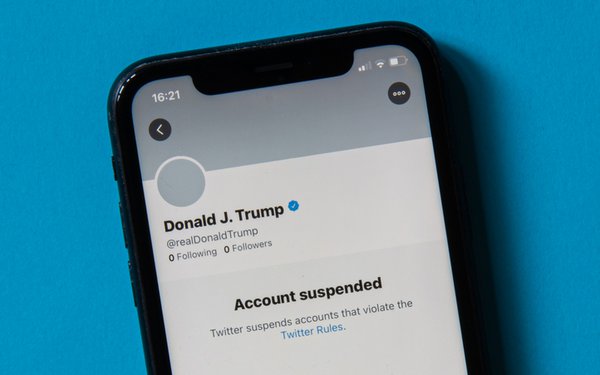Tech Industry Backs Twitter In Battle Over Trump Suspension
- by Wendy Davis @wendyndavis, March 27, 2023

Former President Donald Trump lacks grounds to revive a lawsuit claiming his First Amendment rights were violated when he was banned from Twitter, the tech industry organization NetChoice told an appeals court.
Trump “sued the wrong defendant,” NetChoice writes in a friend-of-the-court brief filed last week with the 9th Circuit Court of Appeals.
The group says even if Trump could prove that government officials coerced Twitter into suspending his account, he would only have grounds to sue the government -- not Twitter.
“NetChoice does not condone political attempts to meddle in private companies’ content moderation decisions,” the group writes. “The government has no business interfering with these decisions, which the First Amendment protects. And if the government’s actions rise to the level of coercion, the courts should hold the government responsible.”
The organization adds that there is “no legal or policy justification” to hold social media companies liable, if they are coerced by the government.
The legal dispute dates to 2021, shortly after Twitter (and other social platforms) suspended Trump's account due to the January 6 riot at the Capitol.
Trump alleged in lawsuits against Twitter, YouTube and Facebook that the companies violated the First Amendment by “censoring” him. (Twitter CEO Elon Musk lifted the ban last year, but the former president is attempting to continue with the lawsuit anyway.)
U.S. District Court Judge James Donato in the Northern District of California threw out the complaint against Twitter last May, ruling that the First Amendment prohibits the government -- but not private companies like Twitter -- from engaging in censorship. The lawsuits against YouTube and Facebook are on hold.
Trump recently asked the 9th Circuit Court of Appeals to reverse Donato's decision, arguing that Twitter was effectively acting at the direction of the government.
“Powerful Democratic legislators threatened to use their official authority to impose Draconian legal consequences against defendants and other social media companies if they did not censor disfavored speakers and speech,” Trump's lawyers contended in their appeal.
Trump's attorneys pointed to several examples of elected officials either calling for Trump to be banned from social media, or calling for changes to Section 230 of the Communications Decency Act -- the statute that protects web companies from lawsuits over users' speech. For instance, Trump's lawyers point to a statement made by Vice President Kamala Harris in October of 2019 (when she was still a senator), calling for Trump's Twitter account to be suspended, and to Rep. Nancy Pelosi (D-California)'s warning that tech companies' legal protections could be in jeopardy, unless they acted with more “responsibility.”
Twitter countered in papers filed earlier this month that Trump's claim is moot urged because his account was reinstated.
The company also asked the appellate court to reject Trump's contention that the ban was the result of government pressure.
“Mere attempts by public officials to persuade private actors cannot amount to coercion,” Twitter writes, adding that Trump didn't allege that any officials threatened to sanction the company unless it suspended him.
“Individual legislators, however powerful, cannot single-handedly amend or repeal Section 230 or any other law,” the company wrote.
NetChoice argues that Trump's “fundamental assertion” -- that Twitter acted due to coercion -- only supports a lawsuit against the government.
The group adds that holding the platform liable for giving in to government demands “would place private actors like Twitter in the impossible position of facing threats if they refuse to accede to government requests, while also shouldering liability for the consequences of those actions.”
NetChoice additionally says Trump's allegations, even if proven true, wouldn't show that Twitter was coerced into acting as an arm of the government.
“None of these exhortations carries the force of law,” Twitter writes, referring to alleged statements by Pelosi, Harris and other elected officials. “They are just politicians engaging in the political process.”


